Report
Long-Term Care Equality Index 2023
Promoting Equitable and Inclusive Long-Term Care and Senior Housing Communities for Lesbian, Gay, Bisexual, Transgender & Queer Residents and their Families.

Long-Term Care Equality Index 2023
Table of Contents
Messages from HRC Foundation President
and SAGE Chief Executive Officer

“The HRC Foundation and SAGE continue to work toward the lived reality of every LGBTQ+ person being able to grow old with dignity and to access the care they need without discrimination or bias. This year, 200 long-term care communities participated in our Long-Term Care Equality Index. This is a huge step towards achieving equity and inclusion for every one of our LGBTQ+ older adults, without exception. Still, our critical work continues, and we look forward to seeing expanded participation in this crucial work in years to come.”
Kelley Robinson
She/Her/Hers
President, Human Rights Campaign Foundation

“One of the biggest concerns facing older LGBTQ+ people is their future – especially when finding welcoming and inclusive places to live and receive care in their later years. Today, 200 long-term care communities nationwide demonstrate their commitment to LGBTQ+ elders with their pledge to the LEI. The LEI is a powerful tool that helps ensure that LGBTQ+ elders get the respectful care they deserve as they age. This is essential for all LGBTQ+ older people, but the need is especially acute for LGBTQ+ elders of color, transgender older people, and LGBTQ+ elders living in rural areas, who often face even greater challenges. SAGE is proud to work with the Human Rights Campaign Foundation on this vital initiative so that LGBTQ+ elders can age with the dignity and respect they deserve.”
Michael Adams
He/Him/His
Chief Executive Officer, SAGE
Why the LEI?

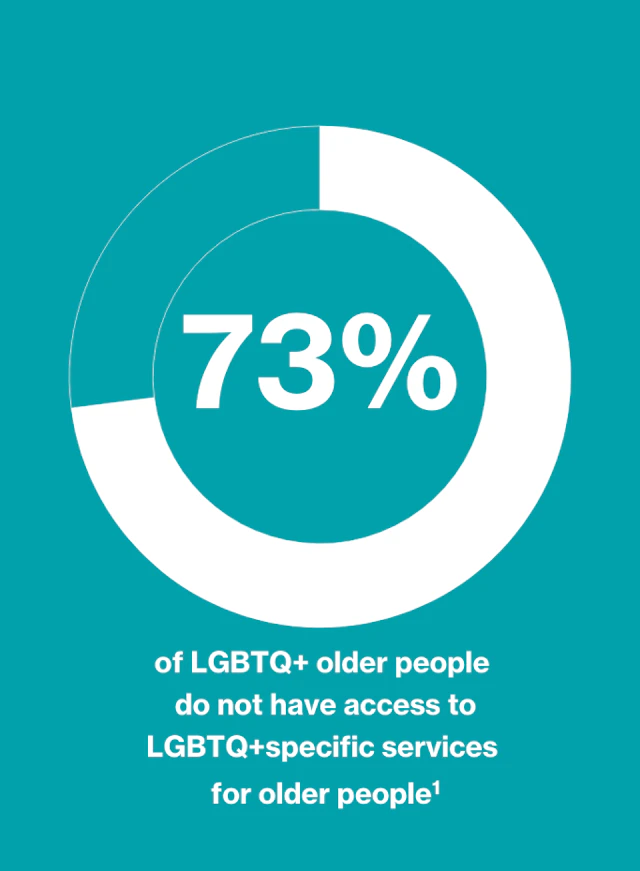
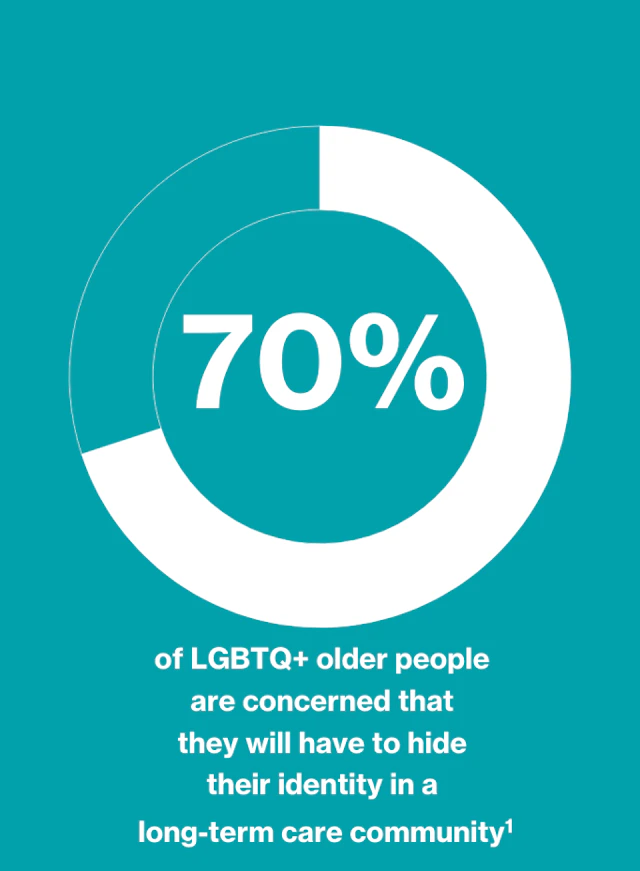
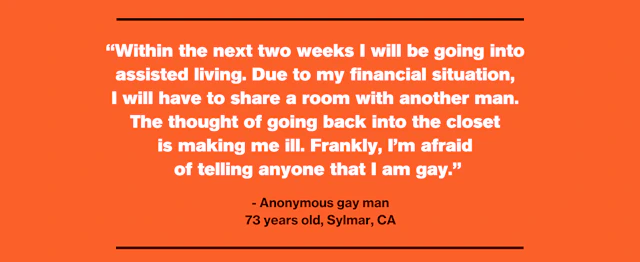
A Growing Population
As the American public ages, it is also diversifying. Now, more than ever, the U.S. older adult population consists of many racial identities, ethnicities, faith traditions, sexual orientations, and gender identities.2 By 2030, studies project the population of lesbian, gay, bisexual, transgender, and queer (LGBTQ+) people over 50 to reach 7 million.3 Despite the older members of the LGBTQ+ community growing in visibility and size, LGBTQ+ elders have historically been invisible to aging service providers, policymakers, and researchers.4
The Need for Care

LGBTQ+ people confront many of the same issues everyone else does when aging — from how to afford the rising costs of housing and healthcare to how to stay connected to loved ones. However, LGBTQ+ older people face additional burdens and fears.
In a study by AARP, 76% of older LGBTQ+ people expressed concern about having adequate social support to rely on as they age. Being less likely to be partnered or have children, LGBTQ+ elders will often need to rely on paid long-term care services and support.3 Stigmatization, lack of identity-affirming treatment, and experiences of discrimination and violence can lead to avoiding necessary services, chronic stress, and increased social isolation among older LGBTQ+ peoples. Additionally, approximately 20% of LGBTQ+ elders are people of color who, as a group, face increased health disparities, higher levels of stigma and have experienced more LGBTQ-related discrimination than their white counterparts, leaving them more at risk of not seeking or receiving the services they need.5
No one should fear rejection or discrimination when seeking the care they need.
The Human Rights Campaign Foundation, and SAGE believe that most long-term care and senior housing communities do not want LGBTQ+ older people to hide their identity, face discrimination or worry about the care they will receive. But long-term care communities and senior housing providers may be unsure how to protect their LGBTQ+ residents from discrimination or develop gender-affirming policies. Long-term care and senior housing, service providers, older people, and their care partners now have a tool to address these concerns and provide inclusive care: The Long-Term Care Equality Index.
______________________________
1 AARP. (2020). Maintaining Dignity: Understanding and responding to the challenges facing older LGBT Americans. AARP Research. Retrieved from https://www.aarp.org/content/dam/aarp/research/surveys_statistics/life-leisure/2020/maintaining-dignity-lgbt-reformatted.doi.10.26419-2Fres.00217.006.pdf
2 Administration on Aging (2022). 2021 Profile of Older Americans. U.S. Department of Health and Human Services. Retrieved from https://acl.gov/sites/default/files/Profile%20of%20OA/2021%20Profile%20of%20OA/2021ProfileOlderAmericans_508.pdf
3 SAGE & National Resource Center on LGBT Aging. (2021). Facts on LGBT Aging. Retrieved from https://www.sageusa.org/wp-content/uploads/2021/03/sage-lgbt-aging-facts-final.pdf
4 Fredriksen-Goldsen, K. I. (2023). Blueprint for Future Research Advancing the Study of Sexuality, Gender, and Equiuty in Later Life. The Gerontologist, 63(2), 373-381, https://doi.org/10.1093/geront/gnac146
5 Hyun-Jun, K., Jen, S., & Fredriksen-Goldsen K. (2017). Race/Ethnicity and Health-Related Quality of Life Among LGBT Older Adults. The Gerontologist, 57(Suppl 1), S30-S39. https://doi.org/10.1093/geront/gnw172

About the LEI
The Long-Term Care Equality Index (LEI) promotes LGBTQ+ inclusive policies and practices in long-term care and senior housing communities and formally recognizes those communities that lead the field in LGBTQ+ inclusion. Through LEI tools and resources such as the LEI biennial survey, LEI webinar series, and technical assistance calls, the LEI helps long-term care and senior housing communities adopt policies and best practices that provide culturally competent care to LGBTQ+ older people. Modeled after the successful Healthcare Equality Index, the LEI measures the following policy and practice areas as benchmarks of LGBTQ+ inclusion in senior housing settings.

3 Tiers of Recognition
LEI participating communities have the opportunity to achieve one of three Tiers of Recognition based on the extent in which they’ve implemented best practices set by the LEI 2023 Criteria. All communities that have foundational LGBTQ+ inclusive policies and practices (Criteria 1) are eligible for a tier of recognition. See below for more information about each of the three LEI tiers of recognition.

LGBTQ+ Long-Term Care Equality Builder
At this tier, communities are beginning their journey and have a solid foundation of key non-discrimination policies that are codified and communicated. To achieve this tier, communities must have all Criteria 1, “Foundational Policies & Practices' ' in place and communicated and must provide staff training on LGBTQ+ care.. These policies include an LGBTQ+ inclusive resident non-discrimination policy, equal visitation policy, employee non-discrimination policy.

LGBTQ+ Long-Term Care Equality High Performer
At this tier, communities are further along in their inclusion journey. In addition to meeting the requirements for the Equality Builder tier, High Performer communities have adopted a minimum of practices in Criteria 2-4, the areas of Resident Services and Supports, Employee Benefits and Policies, and Resident and Community Engagement.

LGBTQ+ Long-Term Care Equality Leader
At this tier, communities have made significant progress in their inclusion journey. In addition to meeting the requirements for the prior two tiers, Equality Leader communities have integrated the majority of practices in Criteria 2-4, the areas of Resident Services and Supports, Employee Benefits and Policies, and Resident and Community Engagements. Equality Leader communities also demonstrate that their employees have access to a transgender-inclusive health insurance plan.

Executive Summary
The LEI 2023 represents the first validated survey on LGBTQ+ inclusion in long-term care and senior housing communities.The Human Rights Campaign Foundation and SAGE are excited to present this report on the 200 communities from 34 states that actively participated in the LEI 2023 survey.
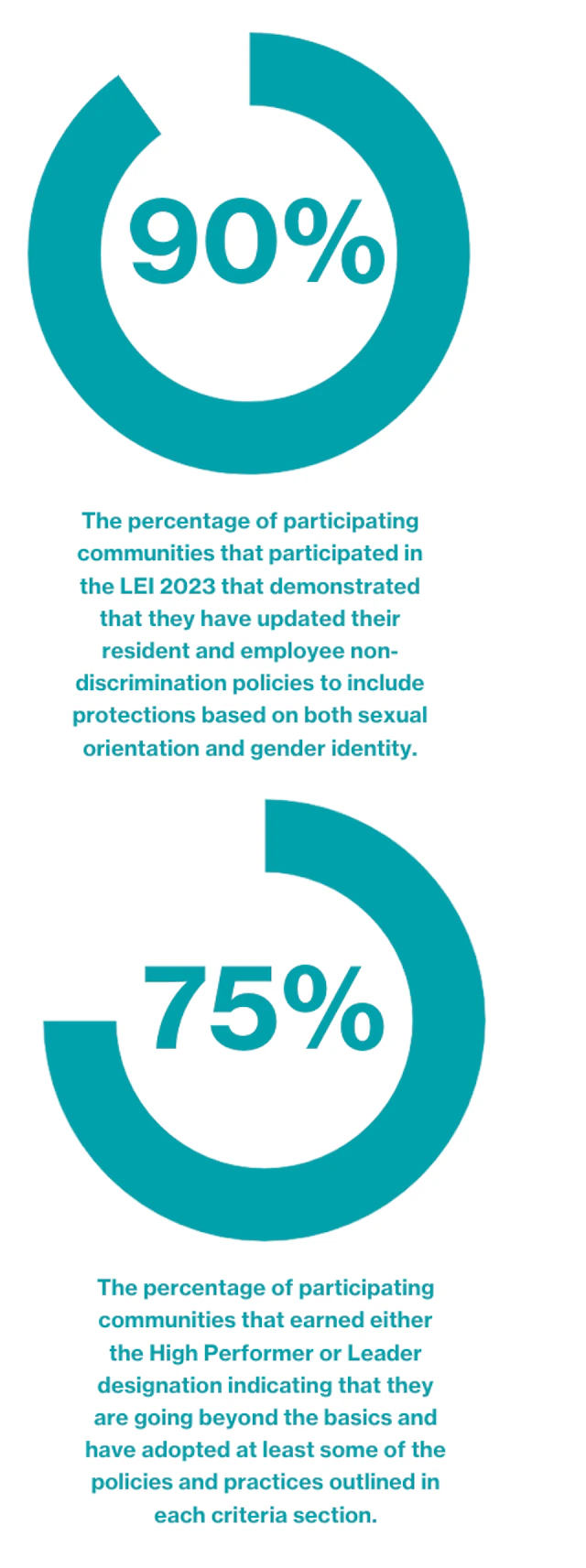
All 200 participating communities deserve to be commended for their commitment to LGBTQ+ inclusion and their efforts to adopt the policies and practices that will make their LGBTQ+ residents, visitors and employees feel safe and welcomed. Foremost among these policies and practices are the foundational non-discrimination policies found in Criteria 1 of the LEI, which calls for an LGBTQ+ inclusive Resident Non-Disrimination, Equal Visitation, and LGBTQ+ inclusive Employment Non-Discrimination Policy.
Ninety percent of the communities that participated in the LEI 2023 demonstrated that they have updated their resident and employee non-discrimination policies to include protections based on both sexual orientation and gender identity. This stands in sharp contrast to what we found when we researched these policies in long-term care communities for our LEI 2021 report. In that report, only 18% of the communities we researched published an enumerated resident non-discrimination policy included both “sexual orientation” and “gender identity” in the policy and only 36% had an enumerated employee non-discrimination policy that included these terms.
Beyond the foundational policies found in Criteria 1, LEI 2023 participants demonstrated that they are also making progress in the remaining criteria sections which include Resident Services and Support, Employee Benefits and Policies, and Resident and Community Engagement. In fact, 75% of participating communities earned either the High Performer or Leader designation indicating that they are going beyond the basics and have adopted at least some of the policies and practices outlined in each criteria section.
While we celebrate these 200 communities and the progress that they have made on LGBTQ+ inclusion, we know that this is just the beginning. We encourage long-term care and senior housing communities to use this unique and invaluable resource to enhance LGBTQ+ care and signal their commitment to LGBTQ+ equity and inclusion. The HRC Foundation and SAGE look forward to welcoming them to the LEI in future years — and helping them extend a warm welcome to LGBTQ+ older people.
By The Numbers
LEI 2023 Participants at a Glance

23K+ residents
17K+ employees
Number of Communities by Level of Care

Communities in 34 States




Unapologetically Inclusive
United Church Homes (UCH) provides housing and healthcare for older people through more than 90 senior living communities across 15 states and in two Native American nations. These include independent living, assisted living, memory care, skilled nursing, and rehabilitation along with affordable housing. With roots in the early part of the last century, UCH remains deeply connected to the United Church of Christ (UUC). The current President and CEO, Rev. Kenneth V. Daniel, is an ordained UCC minister and 75 percent of UCH’s board must be UCC members.
The UCC denomination has a strong history of being open and affirming to LGBTQ+ people. And that became highly relevant when, during a 2010 UCH board strategic planning session, the consultant asked, “What makes you different from your competitors?” One answer immediately stood out as a powerful differentiator: “We’re open and affirming.” And that began the official process of UCH fully embracing LGBTQ+ inclusivity. In the 2011 search for a new leader, the search committee ensured that every candidate was fully supportive and by 2012, the UCH board unanimously voted to become “Open and Affirming.”
In 2012, UCH partnered with SAGE for an initial round of education of board and staff. They reintroduced SAGECare training in 2017 and eventually became the fourth multi-state organization to take part in the SAGECare certification process. Now there are different training modules in the electronic educational system that are designated for specific employee positions. The goal is to ensure that frontline staff, middle-management, and executive staff are trained, with executive staff completing a special four-hour in-person training.

UCH’s website makes the company’s commitment to LGBTQ+ inclusion crystal clear. Their website includes images of LGBTQ+ couples and the About Us section titled, “We Welcome Everyone” states in part, “We invite people to come as they are, providing a safe and welcoming environment that is open and affirming to anyone who walks through our doors. The communities of United Church Homes are open to everyone, regardless of race, gender expression or sexual identity…”
The UCH career website flat-out says, “We’re unapologetically inclusive. Deal with it.” The goal there is to attract millennial (and older) employees who fully expect to work at a place that affirms all sexual orientations and gender expressions. It works. UCH has seen an increase in the number of employees who say they were attracted to UCH because either they or a family member is gay.
The other affirming measures matter, too. A simple rainbow flag sticker on the front door let one resident know that this was the right place to choose, as it meant her gay son—her primary caregiver—would be welcome in her new home.
Then, there are stories like this one, that make it abundantly clear that these efforts have extraordinary and unexpected effects. In a rural community, a very reticent resident had been meeting regularly with the chaplain as his health declined. One day, the resident said, “I’m going to share something I have never told anyone. My son who died in the 1980s died of AIDS. No one in this town knows.” The father had been living in silence for 40 years with his grief. With this conversation he was able to receive affirmation that his son was loved and hear a blessing on their relationship.
UCH has dedicated over ten years to being an “Open and Affirming” community to older LGBTQ+ people through education, inclusive policy, and best practices. Now by participating in the Long-Term Care Equality Index (LEI), UCH has a tool to measure and strengthen their LGBTQ+ inclusion efforts over time. As shared by UCH Administrator, Jeremy Lemon, “participating in the LEI is important because it gives us the opportunity to gauge how well we are ‘walking the talk.’ While working through this process, it occurred to us that while we have been on this journey for years and have made great progress in serving LGBTQ+ older adults, family members of our residents who are part of the LGBTQ+ community, and our LGBTQ+ staff members as an open and affirming organization, that there was still work to be done. The LEI is an important measuring stick as well as a compass for us as we continue to improve our ability to care for this special population.”


Welcome Home
Jan Carver and Norma Long met in 1986 and have been together ever since. Starting off as a long-distance relationship, Jan and Norma drove every other weekend between Pittsburgh, PA and Towson, MD. When given the opportunity, Jan relocated to be closer to Norma. They married in June 2004 in Canada and for over 40 years, Jan and Norma have made Towson their home.
Like many people, Jan and Norma want to spend their retirement years near their friends and family while also making sure their future care needs are met. A former engineer and a retired academic, respectively, Jan and Norma took a methodical approach to choosing a senior living community. With a notebook, selection criteria, and 4-6 communities in mind, Jan and Norma took multiple tours and site visits across the area.
“We wanted a database that we could search to find the information [HRC Foundation and SAGE] are beginning to put together. We had to do this [search for an inclusive community] “door-to-door” and there was no way we could get a sense without immersing ourselves in it…I’m glad that HRC is doing something that can help other people.”
Initially, Jan and Norma assumed they’d end up at a known LGBTQ+ inclusive community located outside of Baltimore. However, when visiting the campus, it was apparent that the sprawling layout, while beautiful, would be an additional challenge and barrier to navigate. Thinking of their current and future mobility needs, it was important to both women to have more direct access to the gym, dining room, and activities.
When visiting a friend at Edenwald, Norma suggested the two of them take a tour. When completing their resident interview with Diane, Director of Sales at Edenwald, Norma made a point to ask how LGBTQ+ friendly the organization was. She asked, “Will we become a problem? The fact that we are a couple, will that be a problem for Edenwald?” Quicky and emphatically Diane expressed, “absolutey not and if you ever, ever feel it becomes an issue let us know.”
After hours of visits, conversations, and pros and cons lists, Edenwald, a community located in the heart of Towson was the winner. “People are friendly, people are welcoming, people are accepting of who you are, where you came from, what your deal is. It feels very comfortable and it continues to feel that way,” shares Norma.
Edenwald is a vibrant retirement community located in the heart of Towson, Maryland, near Baltimore. Offering first-class residential living, services, and amenities, Edenwald provides additional care on-site such as assisted living, comprehensive nursing care, and memory care. Residents select from two types of contracts to cover their stay and care: Life Plan & fee-for-service.
A locally owned and operated not-for-profit, Edenwald’s history of caring goes back more than a century. Founded in June 1881 as the General German Aged People’s Home of Baltimore, and later the Greisenheim, the community was first known for providing quality care for older German citizens. As the aging population grew and diversified, so too did Edenwald’s resident population and campus. Moving to its current site in 1985, today, Edenwald is home to over 380 residents who are supported by over 300 staff members.
“At Edenwald, we are a family and we stand as a family. We will speak out against injustice and will ensure that our staff, our residents and anyone associated with our organization feels valued, respected and appreciated,” writes David Brown, Chief Information and Equity Officer. Over the past year, Edenwald has taken concrete steps towards equity through the formation of a Diversity, Equity, and Inclusion Committee, designation as a Baltimore County Policy Department’s “Safe Space for the LGBTQIA+ Community,” updated their guidelines and policies with inclusive language, and participated in the LEI.


An Interview with Edenwald Chief Information and Equity Officer, David Brown
David Brown began his work at Edenwald in the IT department over ten years ago. Today, he oversees the information and equity needs of Edenwald. DEI-Certified, David chairs the Diversity, Equity, and Inclusion Committee made up of Edenwald residents, staff members and board members.
Why is providing LGBTQ+ inclusive care important to Edenwad?
Providing LGBTQ+ inclusive care is important to Edenwald because it speaks to our organizational values of respecting all people and helping them to live their best lives, so whether it be the resident population we serve, or our team members who dedicate their lives to our mission, we want the services we deliver to speak loudly to what we stand for as an organization. We also understand the challenges and barriers the LGBTQ+ community can encounter when accessing care. LGBTQ+ inclusive care encompasses more than just health needs; we also focus on creating an environment that is respectful, understanding and accepting which improves the overall well-being of members in the LGBTQ+ community.
What are the benefits of providing an LGBTQ+ inclusive housing community?
Because we already serve the LGBTQ+ community, we knew that it was important to speak more directly to the importance of inclusive and supportive housing for this population. Providing LGBTQ+ inclusive housing benefits our residents and their families, team members, visitors and our surrounding community by showing that we are a safe, supportive and welcoming space, where everyone can live their lives authentically. At Edenwald, we want everyone to know that they belong, which helps to reduce isolation and feelings of loneliness.
Why is participating in the LEI important to your organization? What is the benefit?
Edenwald’s participation in the LEI is important because it affirms our unwavering commitment to embrace every individual for who they are, regardless of sexual orientation or gender identity. The benefit of participating in the LEI is that our community knows that we have not only implemented policies, but we have taken actionable steps that are supportive of these policies, which reinforce and celebrate LGBTQ+ inclusion.


Advancing Health Equity
New York City is home to the largest LGBTQ+ population in the United States and NYC Health + Hospitals (NYC H+H) is the largest public health care delivery system in the United States. NYC H+H is dedicated to providing the highest quality health care services to all New Yorkers with compassion, dignity and respect, and regardless of immigration status or ability to pay. It is an integrated network of hospitals, community-based health centers, long-term care and rehabilitation facilities, home care services, correctional health services with a health plan, MetroPlus. Their diverse team of health care professionals – 45,000 strong – provide culturally responsive care to more than one million patients every year in more than 70 patient care locations across the five boroughs of New York City.
As a safety net health system, NYC Health + Hospitals is committed to making health care accessible and affordable. They focus on health and wellness with an emphasis on keeping communities healthy, not just treating injury or illness. They advance health equity by consistently addressing social determinants of health, ensuring workforce diversity and creating models of care that remove barriers for special populations experiencing a disproportionate burden of illness. Their skilled clinicians offer the full continuum of care including primary care, urgent care, behavioral health and specialty services in every area of medicine to improve the health of the communities served and help all New Yorkers live their healthiest life.
NYC Health + Hospitals was the first U.S. municipal health care system to mandate LGBTQ+ training for all staff members in 2011. Over a decade ago, NYC Health + Hospitals/Metropolitan became the first municipal hospital to open a health care center dedicated to the needs of LGBTQ+ patients. Today NYC H+H has seven of these Pride Health Centers. When the Office of Diversity and Inclusion was established in 2016, the LGBTQ+ portfolio was folded into the office to offer a centralized and coordinated approach to meet the needs of LGBTQ+ New Yorkers. At that time, the first Associate Director of Gender Equity was hired to focus on ensuring that the health system’s policies and practices are congruent with meeting the needs of, and creating affirming space for, members of the LGBTQ+ community.

As of 2022, all 18 of NYC Health + Hospitals’ eligible facilities have earned the Human Rights Campaign Foundation’s “Leader in LGBTQ Healthcare Equality” designation — a recognition they have received every year since 2015, so it was a natural progression for NYC H+H’s five long-term care facilities to participate in the first Long-Term Care Equality Index survey.
Throughout NYC Health + Hospitals, policies and procedures have been reviewed to make sure they are inclusive. The required staff training program is strong. Everyone, including long-term care staff, participates in annual training which incorporates LGBTQ+ best practices. In addition, there is a wide array of online training modules that staff can take in a self-directed fashion. If staff choose, they can even seek a Certificate of Advanced Training in LGBTQ+ Health Care, which is issued jointly between NYC Health + Hospitals and The Fenway Institute at Fenway Health (an LGBTQ+ health care, research, and advocacy organization headquartered in Boston). All of the trainings were developed in collaboration with subject matter experts and have been vetted by individuals with lived experience. NYC Health + Hospitals has been intentional about making sure those voices are embedded and heard in all training materials.
Ivelesse Mendez-Justiniano, Interim Chief Diversity & Inclusion Officer at NYC Health + Hospitals states, “the mission of NYC Health + Hospitals is to deliver high quality health care services to all New Yorkers with compassion, dignity, and respect, regardless of income, gender identity, or immigration status. To remain true to our mission we must ensure that we meet the needs of our LGBTQ+ patient population. This can be achieved via the provision of continuous education and increasing the levels of awareness for staff in areas such as Health Equity, Allyship, Inclusion, and Unconscious Bias. Staff at all levels need to join in the journey towards inclusivity. In support of this, the leadership at NYC Health and Hospitals is committed to providing our staff with the tools and learning needed to ensure our LGBTQ+ patient population receives an optimal patient experience every time they walk through our doors.”
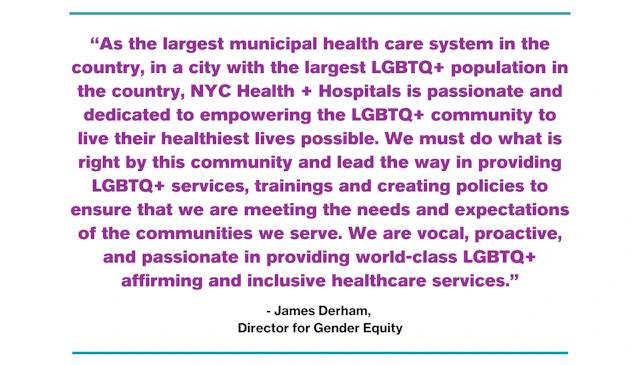

Findings
The Long-Term Care Equality Index 2023 asked participants a series of questions about LGBTQ+ inclusive policies and practices in senior housing. Those questions are divided into four criteria sections.
- Criteria 1: Non-Discrimination and Staff Training
- Criteria 2: Resident Services and Support
- Criteria 3: Employee Benefits and Policies
- Criteria 4: Resident and Community Engagement
Responses to the criteria are reported in aggregate to indicate national trends and facilitate benchmarking. More information about how each participating community responded to these criteria can be found online in the LEI search tool.

Criteria 1: Non-Discrimination and Staff Training
The Non-Discrimination and Staff Training criterion represents policies and practices that are considered foundational to LGBTQ+ resident-centered care.
Resident Non-Discrimination
The first section of the LEI Non-Discrimination and Staff Training criteria calls for a written resident non-discrimination policy (or residents’ bill of rights) that includes both “sexual orientation” and “gender identity.” LGBTQ+ people experience many forms of discrimination in senior housing care because of their sexual orientation and/or their gender identity or expression. An explicitly LGBTQ+ inclusive resident non-discrimination policy can do much to reduce the discrimination that LGBTQ+ residents experience and fear. Learn more about this criterion in the LEI Resource Guide.

96% of LEI participants with an LGBTQ+ inclusive resident non-discrimination policy documented that the policy is readily accessible and communicated to patients in at least two different ways and documented that the policy is readily accessible and communicated to staff in at least one way.
Equal Visitation
The second section of the LEI Non-Discrimination and Staff Training criteria calls for a written visitation non-discrimination policy or an equal visitation policy. The federal government requires that all long-term care communities that accept Medicare or Medicaid payments ensure that residents are granted certain rights and protections, including the right to spend time with visitors of their choice. Learn more about this criterion in the LEI Resource Guide.

82% of LEI participants with an equal visitation policy documented that the policy is readily accessible and communicated to patients in at least two different ways and documented that the policy is readily accessible and communicated to staff in at least one way.
Employment Non-Discrimination
The third section of the LEI Non-Discrimination and Staff Training criteria calls for an employment non-discrimination policy (or an equal employment opportunity policy) that includes both “sexual orientation” and “gender identity.” LGBTQ+ people continue to face discrimination in employment because of their sexual orientation and/or gender identity, creating a need for explicit non-discrimination policies. Learn more about this criterion in the LEI Resource Guide.
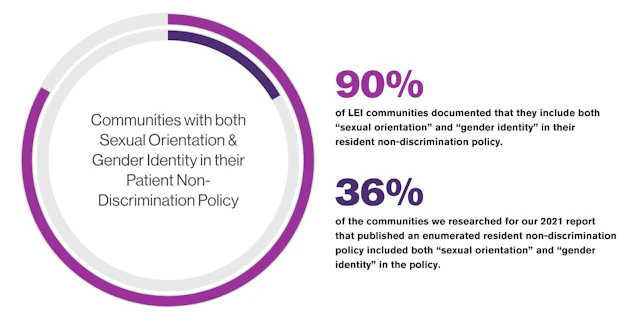
88% of LEI participants with an LGBTQ+ inclusive employee non-discrimination policy communicated the policy publicly.
Staff Training in LGBTQ+ Resident-Centered Care
The fourth section of the LEI Non-Discrimination and Staff Training criteria calls for key facility employees to receive expert training in LGBTQ+ resident-centered care. This criterion recognizes that training is critical for policies to be successful and for LGBTQ+ residents to feel welcome. Learn more about this criterion in the LEI Resource Guide.
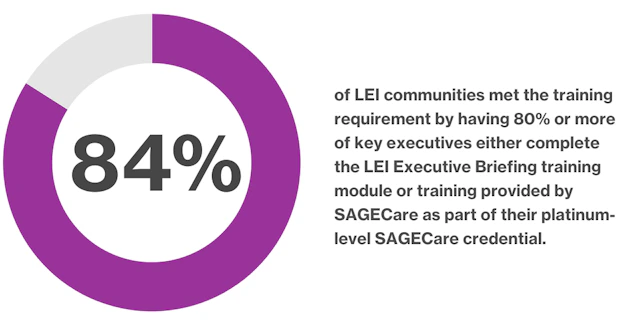

Criteria 2: Resident Services and Support
This criteria section includes a wide variety of best practice recommendations drawn from federal nursing home regulations under the Centers for Medicaid and Medicare Services (CMS), guidance from the National Long-Term Care Ombudsman Program, and additional research and reports regarding the needs of LGBTQ+ older people living in long-term care and senior housing communities.
The LEI Participants demonstrated progress towards numerous policies and practices that promote and support the inclusion of LGBTQ+ residents.
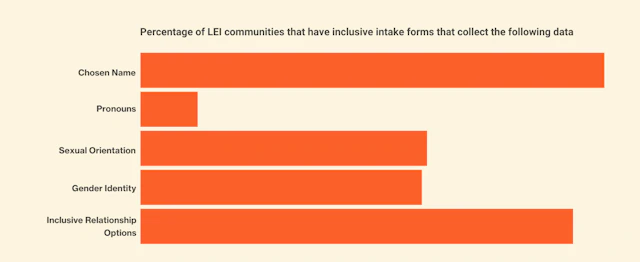



There are also some policies and practices where there is significant room for growth. For example the following policies could be made LGBTQ+ inclusive with the thoughtful addition of sexual orientation and gender identity to the enumerated lists of protected residents.



For more information about best practices for care of transgender residents see the publication, Creating Equal Access to Quality Health Care for Transgender Patients: Transgender-Affirming Hospital Policies, from HRC Foundation, Lambda Legal, and the LGBT Rights Committee of the New York City Bar Association. While created for hospitals, these sample policies can easily be adopted for any residential care setting.


Criteria 3: Employee Benefits and Policies
This criteria section is designed to familiarize communities with best practices to promote equity and inclusion for LGBTQ+ employees. It is critical that LGBTQ+ employees, like LGBTQ+ residents, receive equal treatment, particularly vis-à-vis health-related benefits and policies.
Equal Benefits
Competitive employer-provided benefits packages are critical to attracting and retaining talent. Providing LGBTQ+ employees and their families with inclusive benefits, from healthcare coverage to retirement investments and more, is a low-cost, high-return proposition for businesses. HRC Foundation and SAGE strongly urge employers to maintain domestic partner benefits for their workers as a sign of sustained commitment to family diversity, inclusion and protection of LGBTQ+ employees whose rights outside the workplace are not guaranteed under law in many states. Domestic partner benefits ensure that all employees will be treated equally.


DOWNLOAD OUR WHITE PAPERS FOR MORE INFORMATION ON IMPORTANT LGBTQ+ BENEFITS ISSUES:
Other Support for LGBTQ+ Employees
In addition to providing equal benefits, there are a number of other ways that employers can be inclusive of and supportive of their LGBTQ+ employees.
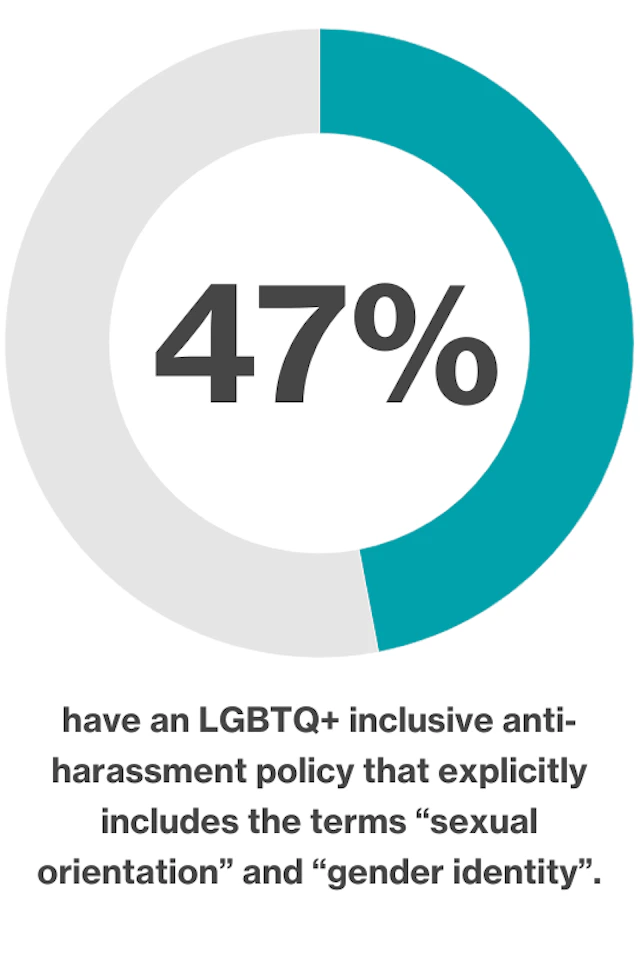
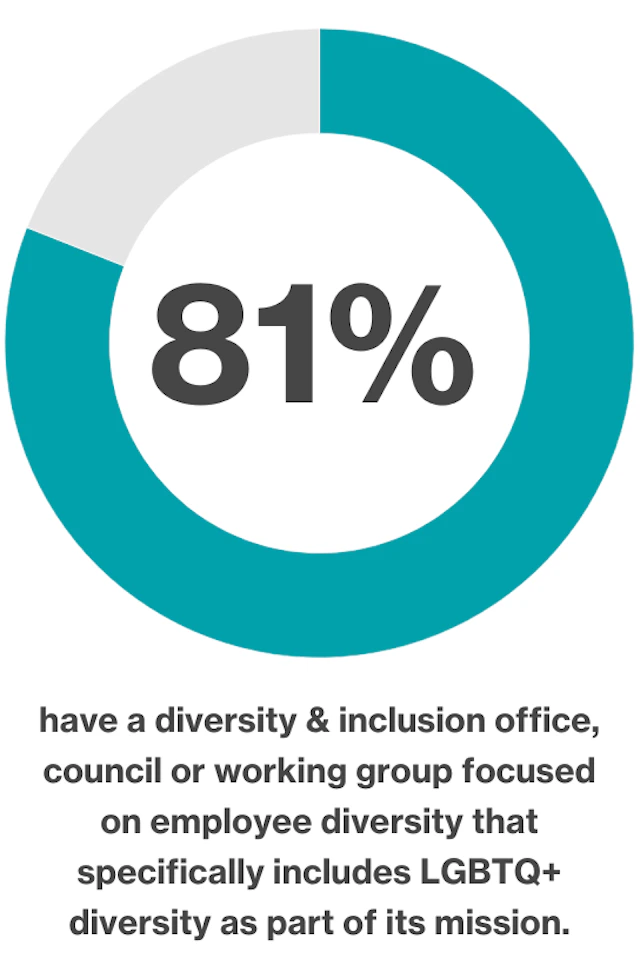
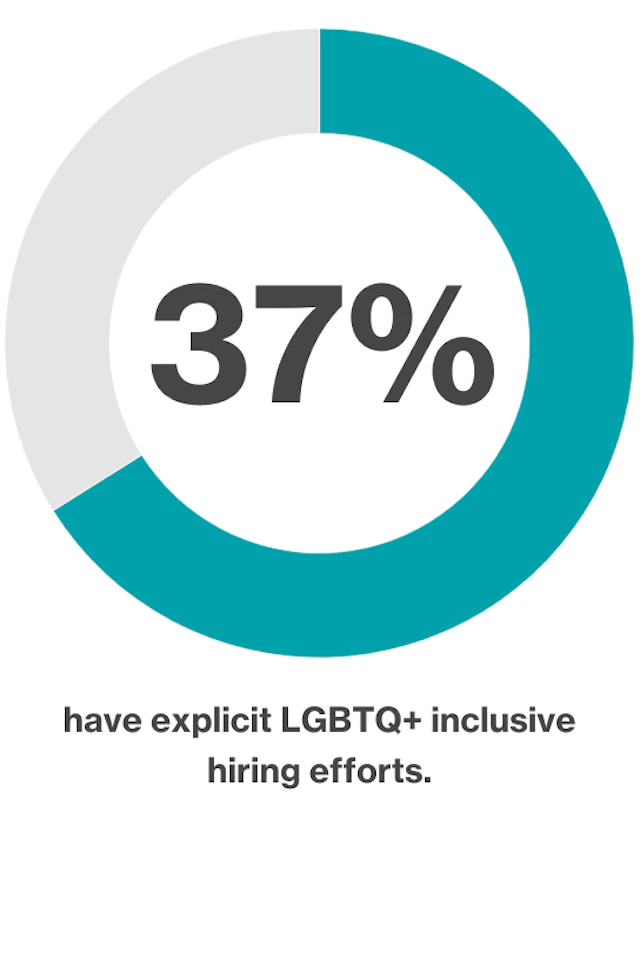
Transition Guidelines
In addition to ensuring healthcare coverage for gender-affirming care, one of the most important policies an employer should have is a set of written gender transition guidelines that document the necessary policies and practices in place to support a respectful and successful workplace transition.

The HRC Foundation’s Transgender Inclusion in the Workplace: A Toolkit for Employers is a comprehensive resource to guide employer transgender inclusion. The toolkit includes HRC’s best practice advice for implementing transgender-inclusive policies and practices (including sample policies) as well as guidance for implementing transgender-inclusive healthcare benefits.

Criteria 4: Resident and Community Engagement
This criteria section helps senior housing communities understand the needs of LGBTQ+ residents and community members and focuses on outreach and promotion to the LGBTQ+ community to let them know that the organization is a welcoming and affirming community.


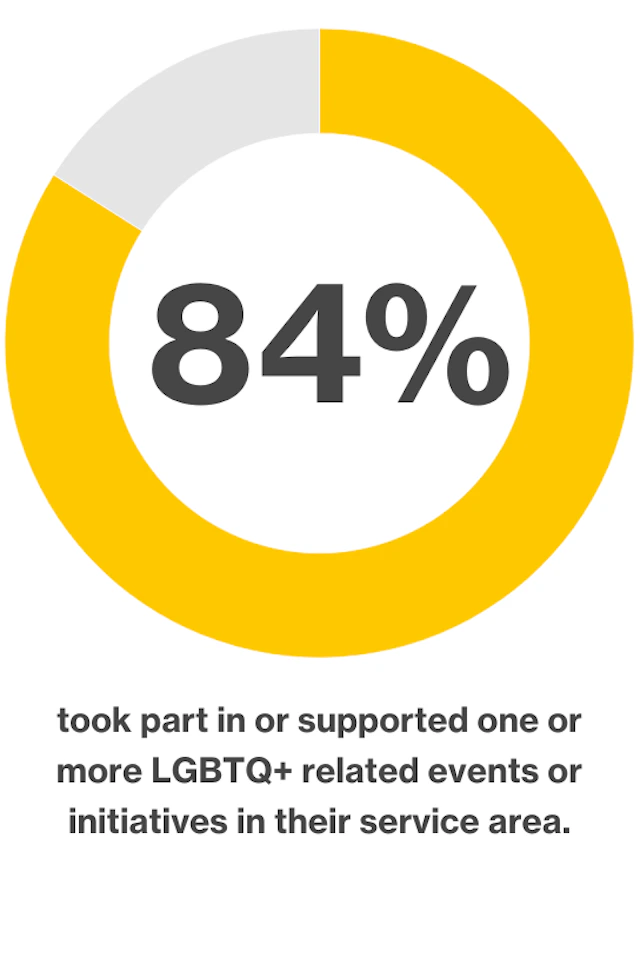

While marketing and advertising to the LGBTQ+ community can be an important outreach tool, a long-term care or senior housing community should not do this without first ensuring that it has the foundational policies and practices in place for LGBTQ+ inclusion. During the LEI research and survey review process it was not uncommon to find that a senior housing community would include LGBTQ+ visual symbols like a pride flag on their website to indicate that they were inclusive, yet upon review of their non-discrimination policies we found that they had not been updated to be LGBTQ+ inclusive. We encourage older LGBTQ+ people or those caring for them to look beyond the website symbols and ask a community about the policies and practices that make them LGBTQ+ inclusive. Learn more in our consumer guide on Finding an LGBTQ+ Inclusive Long-Term Care Community.
Acknowledgements

The LEI Advisory Council
Members of the Long-Term Care Equality Index Advisory Council serve as key advisors in the development and implementation of the LEI. The Advisory Council is made up of a diverse selection of senior housing professionals, aging advocates and LGBTQ+ advocates from across the country.
Kimberly Acquaviva, PhD, MSW, CSE, FNAP, Professor, University of Virginia School of Nursing
Loree Cook-Daniels, Policy and Program Director, FORGE, Inc.
Ben de Guzman, Director, DC Mayor’s Office on Asian and Pacific Islander Affairs
Robert Espinoza, Executive Vice President of Policy, PHI
Sarah Jen, PhD, Assistant Professor, University of Kansas School of Social Welfare
Bruce J. Lederman, President/CEO, Charles E. Smith Life Communities
Rev. Beth Long-Higgins, Vice President of Engagement & Director, Ruth Frost Parker Center for Abundant Aging, United Church Homes
Amity Overall-Laib, Director, National Long-Term Care Ombudsman Resource Center
Lindsay Schwartz, PhD, Founder & Principal, Workforce & Quality Innovations, LLC
Ames Simmons, JD, Policy Consultant, Attorney, and Educator
Rabbi Erica Steelman, MAHL, MPP, Chaplain, Horsham Center for Jewish Life
Nate Sweeney, MA, LNHA, Vice President of Skilled Services, St. John’s
Cornelius Wilson, Chief Engagement Officer, MiGen
Imani Woody, PhD, President and CEO, Mary’s House for Older Adults, Inc.
The LEI Team would like to thank Jerry Brown, Joan Devine, Cassandra Leggett-Coulbourne, and Yasemin Washington for their past service to the LEI Advisory Council.
The LEI Team
The Long-Term Care Equality Index is a project of the Health & Aging Program at the Human Rights Campaign Foundation and Sage.

Tari Hanneman, HRC Foundation, Director, Health and Aging Program
Tari Hanneman (she/her) is the Director of the Health & Aging Program at the Human Rights Campaign Foundation and the author of the HEI. In addition to managing the development and publication of the Healthcare Equality Index, she oversees other projects related to LGBTQ+ health and aging including the new Long-Term Care Equality Index. Tari has more than 25 years of experience in the nonprofit and philanthropic sector, primarily focused in the areas of health and women’s issues. She holds a master’s degree in public administration with an emphasis on nonprofit management from the University of Southern California, where she also did her undergraduate work – Fight On!

Dan Stewart, HRC Foundation, Associate Director, Aging Equality Project
Dan Stewart (he/him) is the Associate Director of the Aging Equality Project for the Human Rights Campaign Foundation. In this role, he co-leads the Long-Term Care Equality Index (LEI), manages national partnerships, and speaks nationally. A proud Chicano, transgender man, and gerontologist, Dan has over 10 years of experience in the aging services and LGBTQ+ advocacy fields.

Shannon Touhey, HRC Foundation, Manager, Health & Aging Program
Shannon Touhey (she/her) is the Manager for the Health & Aging Program at the Human Rights Campaign Foundation. In this role, she fields questions from long-term care communities nationwide about the LEI process, works on LEI survey reviews, and provides logistical support for the Health & Aging team. She holds a bachelor’s degree in public health and sociology from American University.

Sherrill Wayland, SAGE, Director, National Resource Center on LGBT Aging
Sherrill Wayland (she/they) is the Sherrill Wayland, Senior Director of Special Initiatives and Partnerships, for SAGE (providing Advocacy & Services for LGBTQ+ Elders), where Sherrill serves as a trusted thought partner to national initiatives team members and SAGE staff across the organization. They lead the National Resource Center on LGBTQ Aging, serves as SAGE lead for the Long-Term Care Equality Index (in partnership with the Human Rights Campaign Foundation), and works in close partnership with SAGECollab, SAGECare, and the Diverse Elders Coalition. Sherrill earned a Master of Social Work degree from the Brown School of Social Work, Washington University in St. Louis, and has over 25 years of professional experience in the fields of education, disability, and LGBTQ+ older adult advocacy.
Special Thanks
Thank you to HRC Foundation Senior Vice President Jay Brown, HRC Foundation Senior Director, Programs and Corporate Advocacy, Eric Bloem, and Senior Director of Programs & Partnerships, Ellen Kahn, for their continued support and guidance.
Thank you to SAGE Chief Executive Officer Michael Adams, Executive Vice President, Lynn Faria, Chief Experience Officer, Christina Da Costa, and Acting Chief National Initiatives Officer, Hector Vargas, for your visionary leadership and guidance. A special thank you to the entire SAGECare team, Alex Kent, National Projects Coordinator, Karen Cushing, SAGECare Business Development Manager, Nicholas Watson, Managing Director of Social Enterprise, Nicole Paggett, Assistant Director of Data Strategy, and Sadiya Abjani, Director of Training and Instructional Design for their support in developing and hosting the LEI Executive Briefing and promotion of the LEI among SAGECare Credentialed Long-term Care Communities.
Thank you to the HRC’s Data and Analytics Team for all of the assistance in maintaining the LEI data with a special shout-out to Alec Carrasco, who always finds a way to make it work. Thanks to the team at Heller Consulting who built the database behind the LEI and continue to help us improve upon it.
Thank you to past SAGE and HRC Foundation interns and volunteers Morgan Van Vleck and Lillie Levin for their contributions.
Thank you to Robert Villaflor, Josette Matoto and Tarine Wright for design guidance and support.
The LEI 2023 was designed by Tony Frye Design.
Our Funders
The HRC Foundation and SAGE are grateful for the support of these funders.


Participate in the LEI 2025
Why Participate?
Provide high-quality welcoming environments to LGBTQ+ residents and assurance to their care partners
Public recognition as a leader in providing LGBTQ+ welcoming services
Access to best practices for LGBTQ+ diversity, equity, and inclusion
Access to education and resources for serving LGBTQ+ residents
Technical assistance
Improved ability to develop LGBTQ+ culturally appropriate marketing for future staff, clients, and funders
What Organizations are Eligible?
Skilled Nursing Communities
Assisted Living Communities
Independent Living Communities
Memory Care Communities
Life Plan/Continuing Care Retirement Communities
Free-standing Hospice Facilities
Affordable Senior Housing
Steps to Participate in the LEI

Love conquers hate.

Wear your pride this year.
100% of every HRC merchandise purchase fuels the fight for equality.

